American or English Labrador Retriever
We would like to take this opportunity to introduce you to the history of the Labrador Retriever, as we have included our personal history in the homepage text as well as in the section, “about us”. So many people ask us, “what’s the difference between the “English” and the “American” (field) labs? There is such a big difference that the AKC has, at times, considered splitting the breed. There is a difference in build, as well as temperament. If you are looking for strictly a “field” dog for field trial competition, go for the American field dog. They are athletic, tall, lanky, thin, but they can have VERY hyper, high-strung personalities which do not always lend themselves to being the best indoor “family dogs.” (Not EVERY American lab will be this way, we are only talking in general!) On the other hand, the English labs are very blocky, stocky, shorter in their build, but should still maintain good movement and agility in the field. . English labs are very sweet, quiet, mellow, lovely dogs. They still maintain their natural instinct to retrieve and use their noses (after all, Life is too short to hunt with an ugly dog!!), but will be much more controllable in the field, and will also be your family companion at your fireside after a day of hunting. One of the reasons Endless Mt. Labradors stresses, the “all-purpose” lab (English lab) is because we strive to develop ALL the best qualities of the Labrador, and we do not sacrifice one trait in order to emphasize another. If anything, we major on temperament, because a dog can be beautiful in conformation, and have a lovely pedigree, and hunts well, but if it does not pass our temperament test, it is out of our breeding criteria. (feel free to read our many references from our clients on the “references” page of this website!) The Labrador was originally bred to be able to navigate and swim in the icy waters off of Newfoundland, and off the shores of Labrador (a cliffside town). They have a thick undercoat which shields them from the extremes of both cold and heat. Labs first appeared in English maritime towns that were engaged in the fishing industry. Today, the lab is the most popular breed in the U.S. due to their versatility, sporting ability, and their roles as loyal companions. It has the substance and soundness to hunt waterfowl and upland game. The lab has a short, dense, weather-resistant coat, and “otter” tail, a clean- cut head with a broad back skull and moderate stop, and kind, expressive eyes that communicate intelligence and good temperament. Labs have few health problems if bred by a reputable breeder who is selective and screens for defects in their breeding stock. Labs are also wonderfully “maintenance free”…no need for grooming, brushing, etc. Just clip their nails occasionally, give a bath every 2-3 months if kept indoors (they are very “non-oily” dogs, seldom ever “stinky”, and rarely need bathing) Do not “over bathe” it will cause flaking and may dull the coat. Labs are very sensitive to food allergy that may affect their coat and skin (raw sores may erupt if not fed appropriate food! See our “Dog Nutrition” page). Feed ONLY breeder- recommended foods and appropriate supplement. It will save you the headache and heartache of many trips to the vet for simple nutritional needs that specifically pertain to labs. Call or email us for our recommendations.
For the AKC “Breed Standard” for the Labrador Retriever click here
Some terms I hear that are NOT descriptive of an English Labrador:
They don’t have “blockheads”…that infers they are stubborn or something. The term we use is a “blocky head.”
They do not have “short snouts” they have a bit shorter muzzles, but remember, a lab’s form should meet its function, so the muzzle should be large enough to carry a large bird.
English labs are not “fat.” What you are seeing is “bone,” “substance,” and ‘rib-spring.” When I hear someone say, “I have a nice FAT English lab.” I hear “obese.” And if i ask for pictures, I’m usually right. Some people may use the word “stout” and I know what they mean…as long as its muscle, bone, substance and rib spring, its ok…
(If you have questions about the size and weight of a Labrador, see my blogs entitled “How Large is a Labrador” and “A breeder’s note on Obesity)
You have found the site of a reputable breeder…congratulations for doing your homework!!!

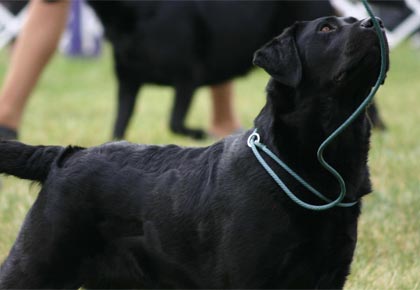
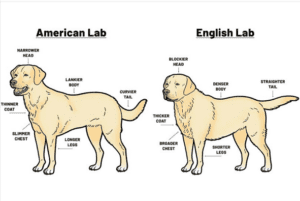
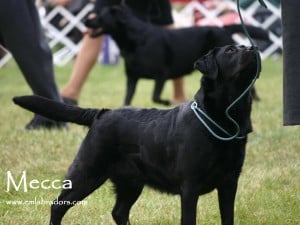

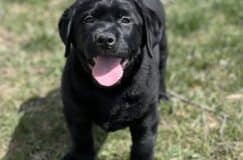


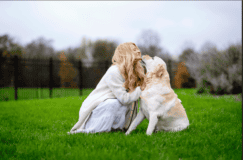

67 Comments